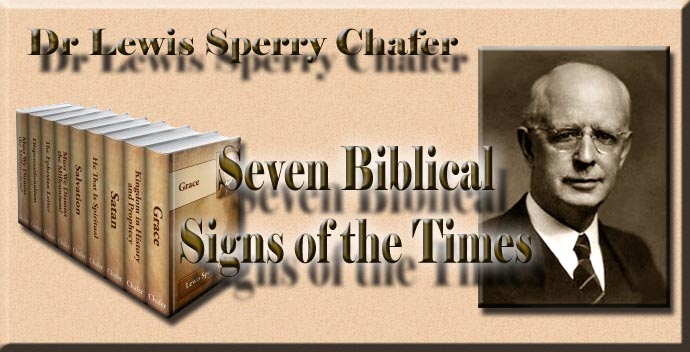
Seven Biblical Signs of the Times
By Lewis Sperry Chafer
Chapter 4
CHRISTIANS MAY DISCERN THE APPROACHING ENDHear the Word of God:
These Scriptures give us sufficient evidence that the instructed child of God may see the approaching of that day. But what day? There is nothing indefinite in the Scriptures as to the goal toward which the world is moving. The great prophetic hope of the Old Testament is toward “The day of the Lord” (indicated also by various phrases as “That day,” or “The day of vengeance,” etc.). It is one of the major themes of the prophets. Isaiah alone speaks of it over sixty times. It is also a great theme of the New Testament; but here it is held in contrast to another day, — a new day which is not seen in the Old Testament. The new day is “The day of Christ.” Read with your concordance and you will discover that “The day of the Lord” is Israel’s day and a day for the whole world. It extends from the glorious appearing of Christ to the end of the millennium. “The day of Christ” concerns only the Church. It is the time of her judgments and rewards. In the second passage just read the Apostle writes: “But of the times and seasons, brethren, ye have no need that I write unto you.” “Times and seasons” is another prophetic phrase, the Biblical meaning of which is made clear. The Jewish disciples came to Jesus after His resurrection and just before His ascension saying: “Lord, wilt thou at this time restore again the kingdom to Israel?” They had every right to ask this question. That kingdom is covenanted to Israel by explicit promises which cannot be broken. Christ did not say to them that their national, earthly kingdom had been abandoned and merged into a spiritual conquest of the whole earth. He said, “It is not for you to know the times or the seasons, which the Father hath put in his own power.” The prophetic term, “times and seasons,” then, indicates the time when Israel’s kingdom will be established in the earth. When the Apostle wrote, “Of the times and seasons, brethren, ye have no need that I write unto you,” he made reference to the day of Israel’s blessing which is also the day of blessing for the whole earth (Psalms 72). Of that great theme there was no need that he should write, for it is everywhere in the Old Testament. Since this passage begins with the word “But,” it is evident that this statement about “The day of the Lord" is mentioned in contrast to something which has gone before. Turning back we discover a description of the events connected with “The day of Christ,"—the new day, the day of the departure of His redeemed from the earth to be forever with Him. Of this day he writes:
This great event is one of the mysteries, or sacred secrets, of God, which means that it was not before revealed as it is here and now. Other passages on this same event read thus:
In contrast to this last passage and but a few hours before, Christ spoke of Israel’s day. He then pictured His return to the earth on the clouds of heaven, the tribes mourning, the regathering of His elect (Israel), and His judgments of the nations when He sits on the throne of His glory (Matt. 24:3 to Matt. 25:46).
|
||
|
||
-
Site Navigation
 Home
Home What's New
What's New Bible
Bible Photos
Photos Hiking
Hiking E-Books
E-Books Genealogy
Genealogy Profile
Free Plug-ins You May Need
Profile
Free Plug-ins You May Need
 Get Java
Get Java.png) Get Flash
Get Flash Get 7-Zip
Get 7-Zip Get Acrobat Reader
Get Acrobat Reader Get TheWORD
Get TheWORD

